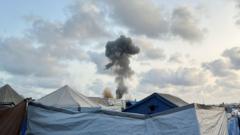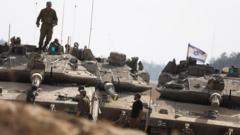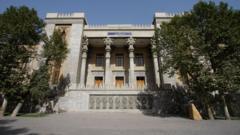### Recent statements from Britain, France, and Canada signal a shift in the diplomatic landscape as humanitarian crises escalate in Gaza.
### Growing Friction: Allies Urge Israel to Halt Escalation in Gaza

### Growing Friction: Allies Urge Israel to Halt Escalation in Gaza
### Major international partners voice strong disapproval over Israel's military actions and humanitarian blockade.
In an unprecedented warning to Israel, key allies expressed alarm over the country's military escalation in Gaza and its stringent blockade on humanitarian aid, which has put the local population on the brink of famine. The conflict, which has now persisted for 19 months, has garnered the strongest condemnation from allies to date.
Britain announced a suspension of discussions aimed at enhancing a free-trade agreement with Israel. This followed a joint statement from Britain, France, and Canada, urging Israel to halt its "wholly disproportionate" military actions and indicating that the high casualty rates and dire humanitarian situation in Gaza are straining the limits of international tolerance.
“If Israel does not cease the renewed military offensive and lift its restrictions on humanitarian aid, we will take further concrete actions in response,” declared the three nations in an unusually pointed public rebuke.
In response, Israeli Prime Minister Benjamin Netanyahu accused the allied countries of inadvertently rewarding Hamas, claiming their stance would only encourage the militant group's resurgence, reminiscent of its assaults that triggered the current conflict on October 7.
A recent warning from Tom Fletcher, a senior U.N. humanitarian official, amplified these concerns, indicating that 14,000 infants in Gaza are at risk of dying within 48 hours without the introduction of aid. However, the U.N. later moderated Fletcher's alarming statement, indicating an uncertain balance in the communication surrounding the crisis.
Britain announced a suspension of discussions aimed at enhancing a free-trade agreement with Israel. This followed a joint statement from Britain, France, and Canada, urging Israel to halt its "wholly disproportionate" military actions and indicating that the high casualty rates and dire humanitarian situation in Gaza are straining the limits of international tolerance.
“If Israel does not cease the renewed military offensive and lift its restrictions on humanitarian aid, we will take further concrete actions in response,” declared the three nations in an unusually pointed public rebuke.
In response, Israeli Prime Minister Benjamin Netanyahu accused the allied countries of inadvertently rewarding Hamas, claiming their stance would only encourage the militant group's resurgence, reminiscent of its assaults that triggered the current conflict on October 7.
A recent warning from Tom Fletcher, a senior U.N. humanitarian official, amplified these concerns, indicating that 14,000 infants in Gaza are at risk of dying within 48 hours without the introduction of aid. However, the U.N. later moderated Fletcher's alarming statement, indicating an uncertain balance in the communication surrounding the crisis.





















